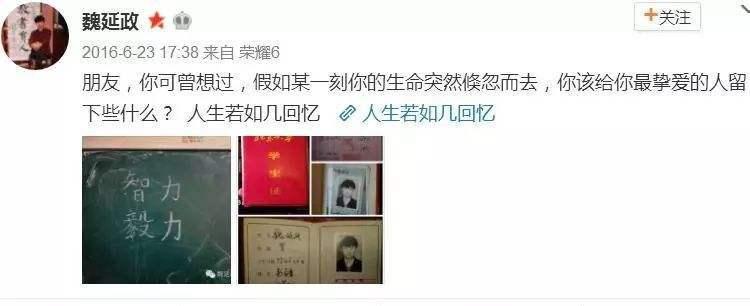"Friend, have you ever thought about it?" If your life suddenly goes by, what should you leave behind for your loved ones? ”
This is the last Tweet of Wei Yanzheng, a former Huawei executive. This Peking University talent, known as the "genius of China's computer industry", finally stopped at the age of 41.

The young man suffered from a relatively rare malignancy, clear cell sarcoma, and underwent chemotherapy, surgery, and even amputation. However, the disease did not stop developing, and the cancer cells on Wei Yanzheng's body continued to spread.
By chance, Wei Yanzheng flipped through an article on the Internet that the ketogenic diet mode of low-carbon water can make the body produce a large number of ketone bodies, let the body passively enter the hunger mode, rely on decomposing fat to maintain normal physiological functions, when the body fat is consumed, cancer cells have no energy to ingest, and naturally they are starved to death. Since then, Wei Yanzheng began to implement a ketogenic diet, strictly limiting the intake of carbohydrates, in an attempt to "starve" cancer cells. However, after persisting for a period of time, the cancer cells not only did not starve to death, but his body developed severe malnutrition due to a long period of insufficient nutrient intake.
The theory of "starving cancer cells" can be said to be a very old and wrong theory. When I first started working, there were indeed patients or family members who discussed this issue with me, saying that they could not eat too well, and eating too well would feed the cancer cells and metastasize faster. Twenty years later, very few patients and family members hold this view, and I did not expect that senior intellectuals who graduated from top schools would still believe in this ketogenic theory of starving cancer cells.
Does good nutrition "feed the tumor"?
No. At present, there is no evidence that nutrition will promote the growth of tumor cells, but reducing or stopping nutritional support will make tumor cells plunder normal tissue cell nutrition, further accelerate the body's malnutrition, tissue and organ damage, and decline in immune function, so that cancer cells can take advantage of the deficiency, not only reduce the quality of life of tumor patients, but even accelerate patient death.
Therefore, reasonable nutritional support has a positive effect on improving the nutritional status of patients, enhancing patient physique, improving treatment effect, improving quality of life and prolonging survival time. Current authoritative international guidelines clearly state that reasonable nutritional support cannot be reduced or discontinued for fear that nutrients will feed tumors. Tumor patients should strengthen nutrition throughout the anti-tumor treatment stage, maintain normal body mass index, nutrition should be balanced, food should be diversified, and for patients with nutritional risks after nutritional assessment, they should increase the intake of high-quality protein.
Can not eating starve tumor cells?
No. Some patients naively believe that without eating tumor cells, there is no nutrient supply, and the tumor can be starved to death. In fact, it is not the tumor cells that starve to death first, but yourself, and the ultimate cause of death is not because of the tumor itself, but because of organ failure caused by severe malnutrition. Both normal tissue cells and tumor cells need nutrients, and when hungry, normal cells have no source of nutrients, and tumor cells will preferentially consume the nutrients stored by the body, resulting in weight loss, malnutrition and even cachexia. Tumor patients are prone to nutritional problems, with 40-80% of tumor patients reportedly malnourished and 20% of patients dying directly from malnutrition.
The "ketogenic diet," known as hunger therapy, is a high-fat, low-carbohydrate, protein, and other nutrient-appropriate formula. To put it bluntly, the ketogenic diet is to eat few or no carbohydrates at all, eat a small amount of protein and a lot of fat.
Since the proliferation of tumor cells mainly relies on glucose fermentation to provide energy quickly, the Warburg effect. Theoretically, the ketogenic diet limits the energy source of tumor cells by restricting carbohydrate intake, relying on fatty acid oxidation in the mitochondria to provide energy for healthy cells. This therapy has been effective in treating refractory epilepsy in children, but there is currently insufficient evidence to suggest that it can be used in patients with oncology. Moreover, the therapy belongs to a high-fat diet and has a certain impact on the increase in blood lipid levels. It is worth mentioning that for patients with advanced cancer, what is most needed is protein, not fat, and excessive fat intake will only increase indigestion and liver and gallbladder burden.